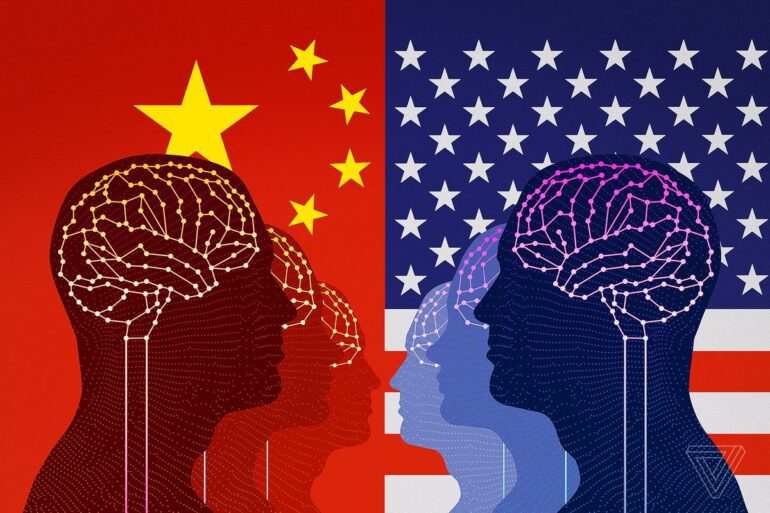TL;DR:
- A bipartisan group of senators is introducing a bill to address the growing influence of artificial intelligence (AI) and its use by U.S. adversaries.
- The Global Technology Leadership Act aims to establish the Office of Global Competition Analysis, analyzing America’s competitiveness in critical technologies like AI compared to China.
- The bill emphasizes the need to evaluate technology leadership to inform policy responses and avoid being caught off guard, as with the advent of 5G.
- Senate Majority Leader Chuck Schumer is prioritizing AI and has called for exclusive AI briefings for senators.
- The legislation falls under the jurisdiction of the Senate Intelligence Committee, and bipartisan support highlights the importance of AI and competition with China.
- OpenAI CEO Sam Altman has engaged with Congress on AI matters, further underscoring its significance.
- Senator Bennet is optimistic about the bill’s prospects and its alignment with Schumer’s efforts on China competition and AI education.
Main AI News:
In a united effort to address the rapid advancement of artificial intelligence (AI) and its utilization by U.S. adversaries, a group of senators is set to introduce groundbreaking legislation. This bipartisan bill, aimed at bolstering America’s competitive edge, comes as Senate Majority Leader Chuck Schumer, D-N.Y., pledges to prioritize AI-related matters. Both Democrats and Republicans are focusing on the significant role of Big Tech, particularly AI, in shaping the agenda of the current Congress.
The proposed legislation, known as the Global Technology Leadership Act, seeks to establish the Office of Global Competition Analysis. This federal entity, consisting of experts from the intelligence community, the Pentagon, and other relevant agencies, will analyze and assess the country’s competitiveness in critical technologies like AI, specifically in comparison to nations such as China. By utilizing intelligence resources and private-sector commercial data, the office will provide crucial insights into America’s position in the global AI landscape. Remarkably, while the Department of Defense regularly evaluates military technologies against other countries, there is currently no equivalent process for assessing critical technologies like AI.
The authors of the bill argue that the establishment of the Office of Global Competition Analysis will not only enhance American competitiveness but also serve as an essential resource for policymakers, ultimately reinforcing U.S. leadership in strategic innovation. Senator Michael Bennet, D-Colo., highlighted the urgent need for such an office, stating, “There is nobody — and I say this with complete certainty — no one in the federal government who can tell us how… the U.S. stacks up in comparison to China in critical technologies like AI.” Bennet emphasized the importance of understanding America’s technology leadership relative to other countries, highlighting the necessity of avoiding surprises, such as the country’s delayed response to the advent of 5G technology.
Led by Senator Bennet, the bipartisan bill has garnered support from co-sponsors Senator Todd Young, R-Ind., and Senator Mark Warner, D-Va. Falling under the jurisdiction of the Senate Intelligence Committee, chaired by Senator Warner, the legislation’s introduction aligns with Schumer’s public commitment to preparing for an AI-defined future and outcompeting the Chinese government, which he has identified as two top priorities for this year.
Schumer, together with Senator Young and Senators Mike Rounds, R-S.D., and Martin Heinrich, D-N.M., sent a joint letter on Tuesday inviting their colleagues to attend a series of exclusive AI briefings. These briefings, intended for senators only, will cover various aspects of AI and its implications. Significantly, the final briefing will be the first-ever classified session dedicated to AI, focusing on adversaries’ use of this transformative technology. Schumer stressed the importance of AI’s imminent impact on workplaces, classrooms, homes, and all facets of life, emphasizing the necessity for readiness.
With Schumer’s keen interest in AI and bipartisan collaboration, the upper chamber is poised to make substantial progress on comprehensive AI legislation. The Senate Judiciary Committee recently heard testimonies from industry leaders, including Sam Altman, CEO of OpenAI, the organization behind ChatGPT. Altman, along with Elon Musk, also engaged in discussions with lawmakers on Capitol Hill, demonstrating the increasing attention AI is receiving at the highest levels of government.
Senator Bennet affirmed that his team has been in discussions with Senator Schumer’s staff regarding the Global Technology Leadership Act. He expressed optimism about the bill’s prospects and praised Schumer’s commitment to legislating around competition with China, which is closely intertwined with their bipartisan efforts to educate the caucus on AI. Bennet believes that aligning legislation with Schumer’s suggestions would form a crucial part of their overall strategy.
Schumer has previously met with Senators Rounds, Young, and Heinrich, establishing a collaborative foundation for their bipartisan group focused on comprehensive AI legislation. The convergence of AI and competition with China presents an opportune moment for bipartisan support and meaningful legislative action.
When asked about the likelihood of the legislation becoming law, Senator Bennet responded optimistically, stating, “I think there’s a high likelihood of success.” The bill’s introduction, coupled with strong bipartisan support and the backing of influential leaders, signals a determined effort to harness the potential of AI while countering the rise of China as a technological powerhouse.
Conclusion:
The introduction of the bipartisan AI bill reflects a proactive approach by the U.S. government to address the challenges posed by China’s technological advancements. By establishing the Office of Global Competition Analysis, policymakers seek to gain critical insights into America’s standing in the AI landscape, enabling informed decision-making and fostering technological leadership. This initiative highlights the significance of AI in shaping market dynamics and the increasing emphasis on competition and innovation in the global market. Industry stakeholders should closely monitor these developments and be prepared for potential regulatory and market shifts resulting from this bipartisan focus on AI.

